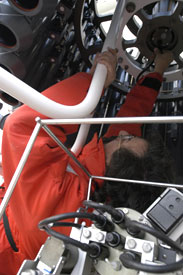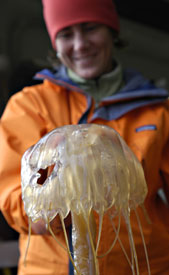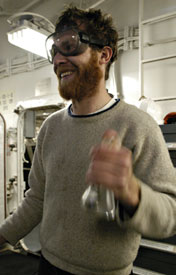 |
Daily Update
Calendar
Dispatch 04 - September 13, 2003
By C. A. Linder
Weather conditions: Overcast skies, 5 kt
winds, 1-2 ft seas, air temperature 28°F
Deja Vu
The small puddles of water on the weather decks were glazed over with ice this morning. The temperature has been slowly dropping as we steam farther out into the Chukchi Sea. The stillness of the cool morning was broken by the whoosh of rotor blades as an HH-65A lifted off from the flight deck, bound for Barrow on a final supply run.
Today our primary
scientific mission was to test out the CTD
system. The first test cast went fairly smoothly, although an unexpected
visitor hitched a ride aboard the rosette. Large jellyfish have been sighted
floating all about the ship lately, and as luck would have it (bad
luck for the jellyfish), as the CTD rosette was being brought to
the surface a large specimen became tangled in the instruments.
Looking like something out of the movie "Aliens" or "Ghostbusters",
the CTD was covered with stringy tentacles and sticky bits of gelatinous goo. The body of the creature was about as big as a human head, and the tentacles measured about 6
feet long. Biologist Carin Ashjian decided that it was a fairly
common variety of jellyfish known as a medusa (Cyanea sp.)
After disentangling it from the instruments, Christina Courcier
returned it to the sea.
 |
 |
 |
 |
 |
| Rob Palomares connects a cable inside the CTD rosette before the first test cast. |
Christina Courcier
takes a closer look at the jelly we "caught" with
the CTD. |
Jeremy Kasper practices
his oxygen bottle shaking technique in "water sample class." |
| Click
to enlarge |
Click
to enlarge |
Click
to enlarge |
Due to some technical difficulties Principal Investigators Rebecca
Woodgate and Bob Pickart decided to delay the mooring deployment until
tomorrow. In the meantime, we are conducting a set of CTD casts across
the mouth of Barrow Canyon. A series of CTD casts in a straight line,
also known as a transect, allows us to see a cross section of water
properties (sample
temperature section from 2002). However, on the first cast of
the section a bit of the cabling connecting the CTD and the computer
that collects the data was pinched, necessitating a lengthy (3 hour)
repair. Luckily, this problem happens frequently enough that the science
party is well equipped to solve it. Marshall Swartz and Rob Palomares
nursed the CTD back to health, and the second cast went beautifully.
Ironically, last year's cruise also started out with a CTD problem
(read 2002
Dispatch 03 for details) -- Bob Pickart remarked that it felt
like deja vu.
The CTDs will continue through the night,
and with luck we will finish sampling this section by tomorrow evening.
To see more images of the science activities, icebreaker, crew, and
the Arctic Ocean, be sure to visit the image
gallery.
 Previous
Dispatch Next Dispatch Previous
Dispatch Next Dispatch

Back to
Calendar
|




